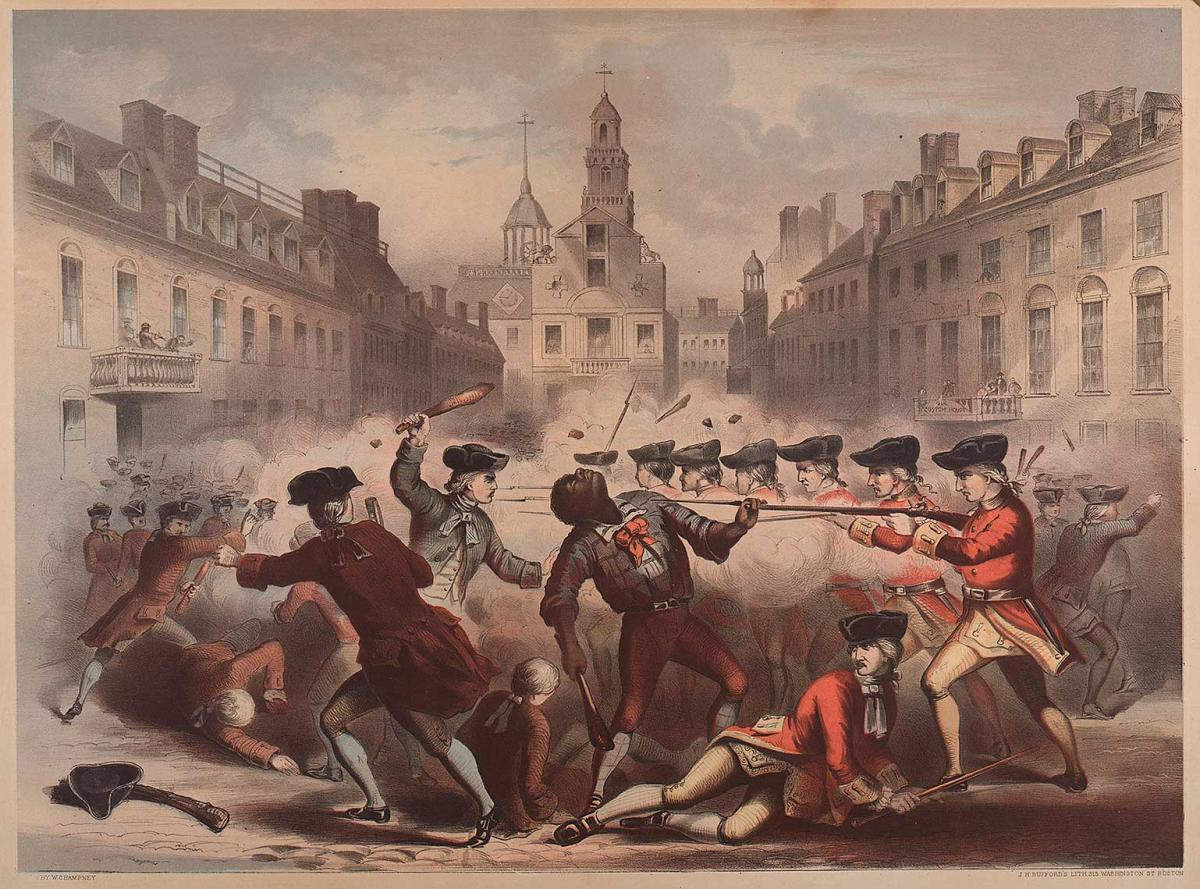
Portrayal of the killing of Crispus Attucks at the Boston Massacre
When I read the many social media posts declaring that the world as we know it in the United States is coming to an end due to the recent election, my thoughts go back to 1776. That year, in a steamy room in Philadelphia, a laboratory of democracy, an imperfect experiment was struck, and 240 years later we are still trying to concoct the right formula to produce the outcome the Founders purportedly intended.
Far too many of us believe that this nation is set; fully developed and permanently cast. Nothing could be further from the truth. We are still in formation, testing theories and systems that are still novel and unique among modern nations. And often we find glaring inconsistencies between theory and practice, models and institutions and rhetoric and reality. At this juncture, the United States is still a work in progress and it might take another 240 years before we come anywhere close to resembling anything remotely like a democracy. After all, as far as nation-states go, we are in our infancy.
It’s an important reminder because our rapid development as a world power belies the weaknesses in our institutions of governance and commerce. We are like the child who is physically larger than what is the norm for his chronological age. Outward appearances suggest a young adult but intellectually he is still very much a child. To the world, we appear to be a highly-developed nation, and as citizens we help ply that fable but, in reality our revolution continues. It never ended. We have had flashes that suggested otherwise but history teaches us a different lesson.
For many people, it is inconceivable that in 2016 there could be racism, sexism, religious bigotry or xenophobia in America. When reading the Constitution, particularly its pre-edited language, it is clear those men eleven years after declaring independence did not anticipate a day when this nation would have free Blacks recognized as citizens. Most likely the Founders believed Blacks would either be colonized back to Africa or our numbers so diminished that what their brutality did not extinguish, nature would eventually thin our ranks. So much of the conflict we witness today around rights and the question of whether Black lives matter stems from the fact that our existence in the 21st century was a matter of imagination. We have been filling in the blanks and imagining ourselves as Americans since 1776.
Every conflict and upheaval over rights has simply been a course correction; a concerted push, and sometimes determined resistance, to make real the idealistic language of the Founders. Liberation is a process and freedom a destination to which we have not arrived in America.
We are still in that process and no matter how the aesthetics might suggest we have come close to parity with whites, that distance is still great and truthfully, those of us living today will not reach our desired destination.
The Revolutionary War, Civil War, Reconstruction, Jim Crow, the civil rights movement and the current formulation that Black Lives Matter are all incremental steps in the formation of a truly democratic America. Too many of us believe that in 2016 the question should be settled on what this nation represents. It is not. We are still in a moment of revolution.
Like earlier periods of this revolution, we need to embrace a warrior spirit and move with determination in claiming our rightful place in this nation. We have been duped by our relative material gain since 1776 and the conveyance of acceptance that has come by government dictate. In many ways, we have forestalled progress by assuming equality and surrendering our moral authority in exchange for a place in the room but not a seat at the table. We fail to acknowledge the gulf that exists between what a large swath of this nation believes about us and what we wish to believe is our status.
We need to get back to work and focus on building the infrastructure for liberation. Too much time has been spent lamenting what we don’t have, or over-emphasizing the little we do have. It’s time to use what we do have and be strategic in setting a course that will allow future generations of Blacks in the United States to live free and unencumbered by hate and violence. That won’t happen unless we get serious about educating our children, supporting our institutions of higher learning, reforming our faith-based institutions and holding them accountable to our community, forging relationships with Africa and the Caribbean, and building business enterprises that can employ our people and make strategic investments in our community. Voting, while important, is insufficient as a singular tool to change our destiny.
Lastly, we must honor the past but not be held hostage by it. Every period of this revolution has required different strategies to make advancements. This time is no different. We have to acknowledge and be open to the idea that what worked in the past, might not work today. There can be no ownership of ideas. Freeing our minds is one of the most important steps we have to take if someday we are to be truly free.
Walter Fields is Executive Editor of NorthStarNews.com.












